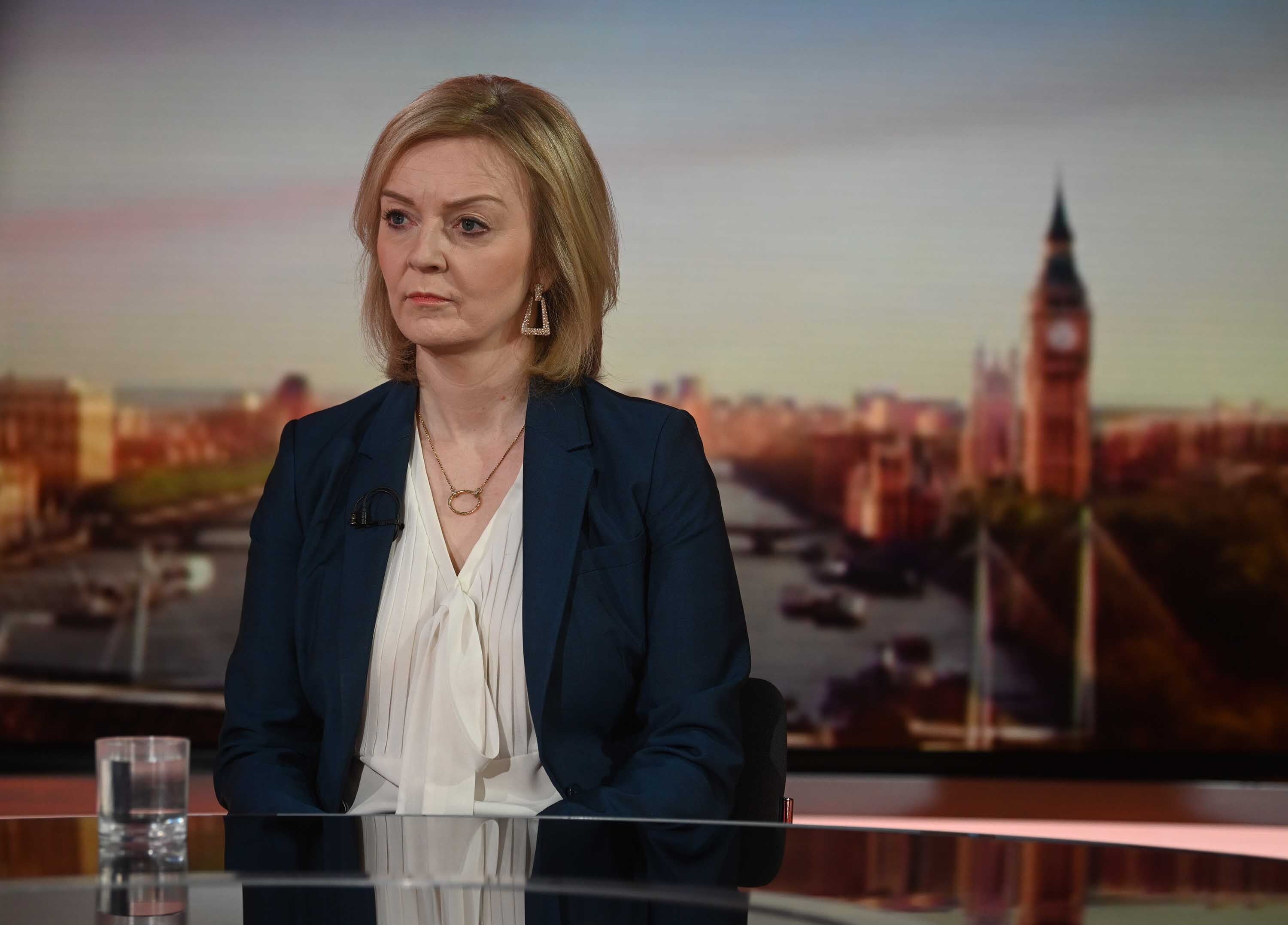Russia could use ‘most unsavoury means’ to win in Ukraine, Truss warns
The Foreign Secretary said any use of unconventional weapons in Ukraine would be an ‘extremely serious escalation’ of the conflict.

Your support helps us to tell the story
From reproductive rights to climate change to Big Tech, The Independent is on the ground when the story is developing. Whether it's investigating the financials of Elon Musk's pro-Trump PAC or producing our latest documentary, 'The A Word', which shines a light on the American women fighting for reproductive rights, we know how important it is to parse out the facts from the messaging.
At such a critical moment in US history, we need reporters on the ground. Your donation allows us to keep sending journalists to speak to both sides of the story.
The Independent is trusted by Americans across the entire political spectrum. And unlike many other quality news outlets, we choose not to lock Americans out of our reporting and analysis with paywalls. We believe quality journalism should be available to everyone, paid for by those who can afford it.
Your support makes all the difference.Britain has said Vladimir Putin may be prepared to use “the most unsavoury means” to secure victory in Ukraine amid warnings he could unleash Moscow’s arsenal of battlefield nuclear weapons.
Foreign Secretary Liz Truss said any use of nuclear or chemical weapons would represent an “extremely serious escalation” of the conflict which could see Russian leaders brought before the International Criminal Court.
Her warning came after the Commons Defence Committee chairman Tobias Ellwood said that in the “worst-case scenario” Mr Putin could deploy low yield tactical nuclear weapons if his forces failed to make a breakthrough.
With the Russian advance on the capital, Kyiv, apparently bogged down in the face of fierce Ukrainian resistance, Ms Truss said the survival of Mr Putin’s regime could now be at stake if his invasion plan failed.
“This could well be the beginning of the end for Putin. I fear that he is prepared to use the most unsavoury means in this war,” she told Sky News’s Trevor Phillips on Sunday programme.
Asked about Russia’s arsenal of chemical and tactical nuclear weapons, she said: “I fear this conflict could be very, very bloody.
“I urge the Russians not to escalate this conflict but we do need to be prepared for Russia to seek to use even worse weapons. I think it would be hugely devastating. We need to avoid this at all costs.”
Speaking later on the BBC’s Sunday morning programme, she said that senior Russian officials could be tried for war crimes “if they do go into that arena”.
“This would be an extremely serious escalation of the situation,” she said.
“The International Criminal Court has already said they are looking at what is happening in Ukraine and if I was a senior Russian official, or indeed the president, I would be very wary of taking further steps.”
Western officials have previously raised the prospect that the Russian could use thermobaric “vacuum bombs” which suck in oxygen to create a devastating, high temperature blast.
Mr Ellwood said Western allies needed to think now what their response would be if Mr Putin were to use unconventional forces.
“He could certainly use other weapons systems which haven’t been really tested or that we aren’t really used to,” he told the BBC.
“Chemical weapons, the worst case scenario would be low yield tactical nuclear weapons as well. We need to ask those questions as to what we would do.”
Following the co-ordinated announcement by the UK, US, EU and Canada late on Saturday that some Russian banks would be excluded from the Swift global payments system, Ms Truss said it was vital to maintain pressure on Moscow with more economic sanctions.
She said the Government would bring forward its planned Economic Crime Bill next week and was drawing up a “hit list” of Russian oligarchs who would be targeted with travel bans and asset freezes in the coming weeks.
“There are over 100 billionaires in Russia. We have compiled a hit list of oligarchs. We are working through and putting the cases together, and every few weeks we will sanction new oligarchs,” she told Sky News.
“We will be targeting oligarchs’ private jets, we will be targeting their properties, we will be targeting other possessions that they have and there will be nowhere to hide.”
Ms Truss acknowledged there would be an “economic cost” to pay but said it was essential that President Putin was stopped in Ukraine to avert future wars in Europe.
“If we don’t stop Putin in Ukraine we are going to see others under threat – the Baltics, Poland, Moldova, and it could end up in a conflict with Nato,” she said.
“Yes, there will be an economic cost here in Britain, there will be a cost in terms of access to oil and gas markets. I firmly believe that the British public understand the price we will pay if we don’t stand up to Putin now.”
Labour meanwhile has stepped up calls for the Russian ambassador to the UK Andrei Kelin to be expelled from the country.
Shadow foreign secretary David Lammy said that when he came to Parliament recently, Mr Kelin had denied Russia was massing troops on the Ukrainian border or was planning to invade.
“We’ve had lie after lie. It’s time for him to leave our country,” he told Sky News.